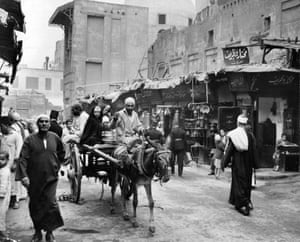
In the days before Egyptian president Hosni Mubarak was ousted in February 2011, Alaa al-Aswany, dentist, novelist and founder member of the democratic movement Kefaya (“Enough”), was one of the most influential voices of the leaderless revolution. His 2002 debut novel, The Yacoubian Building, sold more than a million copies, laying bare the political corruption, degrading poverty and rising religious fervour that drove thousands to occupy Tahrir Square.
Since then, Egypt has experienced the military overthrow of its first democratically elected leader; the massacre of the deposed president’s Muslim supporters; and the rise of a new regime under Abdel Fatah al‑Sisi, which Aswany claims to have brought “freedom of expression to its lowest point, worse than the days of Mubarak”. Now Aswany’s criticism of the government has become headline news. On 11 December it was revealed that he had been forced by the authorities to shut down one of his regular public seminars, while his political columns and media appearances have been suspended.
All this means that the English translation of Aswany’s most recent novel, first published in Arabic as The Automobile Club in 2013, could hardly be more urgent, not least because he once again takes the example of Egypt’s fairly recent history to illustrate a country on the brink of violent, irreversible change.
As with his first novel, Aswany presents a top-to-bottom critique of Egyptian society by cutting a cross-section through an iconic building. The Automobile Club, like the Yacoubian building (where Aswany established his first dental clinic) actually exists, in the same shabby, downtown neighbourhood of Cairo’s former European quarter. Aswany imagines the club in its heyday, between the end of the second world war and the officers’ coup of 1952, when it functioned as a louche haven for moneyed foreigners and a favourite bolthole of the King – who is not named in the book, but is clearly a portrait of the sybaritic Farouk I, a man famed for eating 60 oysters in one sitting and acquiring the 94-carat Star of the East diamond without paying for it.
Then there are the servants, subject to a brutal reign of terror exercised by the King’s sadistic personal valet, Alku, who causes the elderly Abd el-Aziz Gaafar, a former rural landowner fallen on hard times, to literally die of humiliation. As inThe Yacoubian Building, the cast of characters is vast and not always easy to keep track of, but the principal narrative follows the affairs of Gaafar’s family, in particular his exemplary son Kamel, who combines doorkeeping duties at the Automobile Club with studying for a law degree. He forms a taboo relationship with his boss’s daughter, a self-willed English girl who espouses an EM Forsterish desire to experience “real life with real Egyptians”.
The Yacoubian Building features a plotline in which a law-abiding young Muslim becomes radicalised having been subject to police brutality. Kamel likewise falls into a resistance group of democratic sympathisers led by a renegade prince who worries that “the king’s love of gambling has turned the Automobile Club into the seat of Egypt’s government”. Kamel is ultimately fated to suffer the worst indignities that the security forces can inflict on him.

0 comments:
Post a Comment